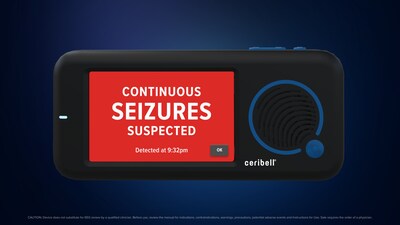New Clinical Evidence Links Ceribell Point-of-Care EEG to Shorter Hospital Stays and Better Functional Outcomes Compared to Conventional EEG
—Five abstracts presented at the 2024
—Clarity remains first and only device FDA 510(k) cleared for the diagnosis of electrographic status epilepticus—
"These two sub-analyses reinforce the importance of early seizure detection and management in improving outcomes for critically ill patients," said
Research presented at NCS included:
- A sub-analysis of SAFER-EEG that demonstrated shorter median hospital stay and that patients initially monitored with Ceribell were 33% less likely to leave the hospital with significant functional disability.*
- A second sub-analysis of SAFER-EEG that linked Clarity seizure burden to poor functional outcomes as measured by the modified Rankin Scale.
- An analysis led by Khalid Alsherbini, M.D., F.N.C.S., from
Banner University Medical Center inPhoenix , demonstrated that the Ceribell System provided reliable signal quality for up to 24 hours—the maximum duration examined— suggesting that it supports long-term, continuous monitoring. - Another analysis led by Dr. Alsherbini highlighted variability in clinicians' interpretation of EEG data, underscoring the importance of standardizing diagnosis with AI tools such as Clarity.
- An analysis by Veeresh Kumar Shivamurthy, M.D.,† from
Saint Francis Hospital and Medical Center,Trinity Health of New England , demonstrated improved detection of status epilepticus and seizure-related patterns in the latest version of Clarity.
"When it comes to seizures, time is brain. Early detection and intervention are vital in the emergency department and the ICU, as millions of patients in these settings are at risk of non-convulsive seizures that can result in permanent brain injury and even death if left undetected and untreated," said
Ceribell is exhibiting in booth #203 at NCS.
Learn how Ceribell point-of-care EEG transforms patient care here.
About the Ceribell System
The Ceribell system is a novel, point-of-care EEG platform designed to address the unmet needs of patients in the acute care setting. By combining proprietary, highly portable, and rapidly deployable hardware with a sophisticated AI-powered algorithm, the Ceribell system enables rapid diagnosis and continuous monitoring of patients with neurological conditions. The Ceribell system is FDA 510(k) cleared for indicating suspected seizure activity and currently utilized in intensive care units and emergency rooms across the
About Ceribell
Ceribell is a commercial-stage medical technology company focused on transforming the diagnosis and management of patients with serious neurological conditions. The Ceribell System is an AI-powered, rapidly deployable point-of-care electroencephalography ("EEG") platform designed to address the unmet needs of patients in the acute care setting. The company is headquartered in
*Using modified Rankin Scale score greater than or equal to 4 at discharge as an indicator of significant functional disability
† Disclosure: Veeresh Kumar Shivamurthy is an employee of Ceribell.
MEDIA CONTACT
press@ceribell.com
INVESTOR CONTACT
investors@ceribell.com
Abstracts
(1) Struck AF, et al. Association Between Functional Outcomes and Automated Seizure Burden Algorithm obtained via a rapid point-of-care EEG device. Neurocritical Care Society Abstracts from the 22nd Annual Meeting 2024. Neurocrit Care (2024).
(2) Struck AF, et al. Access to
(3) Shivamurthy VKN, et al. Improvements in Detecting Nonconvulsive Status Epilepticus in Post-Cardiac Arrest Patients by an Automated Seizure-Burden Monitoring Algorithm. Neurocritical Care Society Abstracts from the 22nd Annual Meeting 2024. Neurocrit Care (2024).
(4) Alsherbini K, et al.
(5) Alsherbini K, et al. Inter-rater Variability When Determining Electrographic Status Epilepticus and the Implications for Single-Rater Accuracy Assessments. Neurocritical Care Society Abstracts from the 22nd Annual Meeting 2024. Neurocrit Care (2024).
![]() View original content to download multimedia:https://www.prnewswire.com/news-releases/new-clinical-evidence-links-ceribell-point-of-care-eeg-to-shorter-hospital-stays-and-better-functional-outcomes-compared-to-conventional-eeg-302278333.html
View original content to download multimedia:https://www.prnewswire.com/news-releases/new-clinical-evidence-links-ceribell-point-of-care-eeg-to-shorter-hospital-stays-and-better-functional-outcomes-compared-to-conventional-eeg-302278333.html
SOURCE


